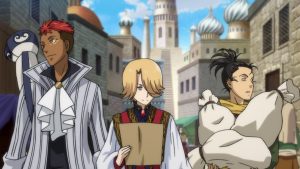 In watching events playing out in Shoukoku no Altair, it’s hard not to reach the conclusion that the Balt-Rhein is simply better at playing the game of world domination than Turkiye. At the very least it can be said that so far, they’ve outflanked Turkiye at almost every turn. Partly that may be a function of the fact that Turkiye was complacent, in the sense that they seemed to be more of less content with the status quo. It was Balt-Rhein that had the ambition, and so far they’ve shown both the cleverness and ruthlessness to back it up.
In watching events playing out in Shoukoku no Altair, it’s hard not to reach the conclusion that the Balt-Rhein is simply better at playing the game of world domination than Turkiye. At the very least it can be said that so far, they’ve outflanked Turkiye at almost every turn. Partly that may be a function of the fact that Turkiye was complacent, in the sense that they seemed to be more of less content with the status quo. It was Balt-Rhein that had the ambition, and so far they’ve shown both the cleverness and ruthlessness to back it up.
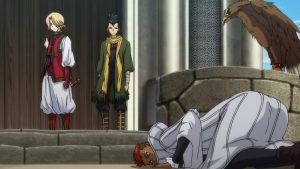 All of that may be proving a rather harsh lesson for Mahmut, but then harsh lessons for Mahmut are more or less the central pillar of Shoukoku no Altair. He remains loyal to his homeland despite what some could argue is unfair treatment (and indeed, some do in this episode). His travels have taken him to Muzrak, one of the four states that theoretically swear allegiance to Turkiye as part of a loose military alliance that’s designed to kick in when the shit hits the fan. It’s certainly doing that now, but when a vote is called to effectively impose martial law and activate the compact as a result of Balt-Rhein’s (mostly successful) aggression, all four of them vote against it.
All of that may be proving a rather harsh lesson for Mahmut, but then harsh lessons for Mahmut are more or less the central pillar of Shoukoku no Altair. He remains loyal to his homeland despite what some could argue is unfair treatment (and indeed, some do in this episode). His travels have taken him to Muzrak, one of the four states that theoretically swear allegiance to Turkiye as part of a loose military alliance that’s designed to kick in when the shit hits the fan. It’s certainly doing that now, but when a vote is called to effectively impose martial law and activate the compact as a result of Balt-Rhein’s (mostly successful) aggression, all four of them vote against it.
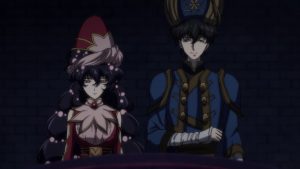 It isn’t hard to guess why those four states chose this route, and indeed the Empire seems to have some voices inside the council itself. As Suleyman notes, Mahmut seems to have truly awful luck, because he always seems to be at the epicentre of whatever military-political crisis is breaking out – but I guess for a young Bimbashi trying to earn his title back these crises are opportunities. Inside the council Zaganos is assuming most of the responsibility for fighting off Balt-Rhein’s gains, and he sees Mahmut’s position (geographic and political) as an ideal tool for counterinsurgency. If the uprisings he’s fomenting in the four states fail, Zaganos can always throw Mahmut to the wolves and Turkiye can protest their innocence.
It isn’t hard to guess why those four states chose this route, and indeed the Empire seems to have some voices inside the council itself. As Suleyman notes, Mahmut seems to have truly awful luck, because he always seems to be at the epicentre of whatever military-political crisis is breaking out – but I guess for a young Bimbashi trying to earn his title back these crises are opportunities. Inside the council Zaganos is assuming most of the responsibility for fighting off Balt-Rhein’s gains, and he sees Mahmut’s position (geographic and political) as an ideal tool for counterinsurgency. If the uprisings he’s fomenting in the four states fail, Zaganos can always throw Mahmut to the wolves and Turkiye can protest their innocence.
 The key player in Muzrak is Balaban (Nakai Kazuya), the sultan who rules as a monarch. He likes pretty boys and hates those who “sneak away” – like his youngest brother Beyazit (Uchiyama Kouki). He’s leading the uprising of Turkiye loyalists (he also happens to be the Kulak in Muzrak), and he and 500 followers – along with Balaban’s niece – have barricaded themselves inside the water shrine. It’s he who Mahmut meets with initially upon his arrival in town (as usual, Louis’ people have beaten him there and set up shop), and he’s an obvious potential ally for Mahmut down the line (assuming he’s escaped his brother’s attempt to murder him, which I’m sure he has).
The key player in Muzrak is Balaban (Nakai Kazuya), the sultan who rules as a monarch. He likes pretty boys and hates those who “sneak away” – like his youngest brother Beyazit (Uchiyama Kouki). He’s leading the uprising of Turkiye loyalists (he also happens to be the Kulak in Muzrak), and he and 500 followers – along with Balaban’s niece – have barricaded themselves inside the water shrine. It’s he who Mahmut meets with initially upon his arrival in town (as usual, Louis’ people have beaten him there and set up shop), and he’s an obvious potential ally for Mahmut down the line (assuming he’s escaped his brother’s attempt to murder him, which I’m sure he has).
 Mahmut is certainly Balaban’s type, and it’s no surprise that the Sultan initially tries to win him over to his team. His argument has some appeal – it would be easy to imagine that someone in Mahmut’s position might feel hard-done (he did indeed “accomplish more” at Hisar than anyone), but unfortunately for Balaban and his libido Mahmut’s ego is modest enough that he’s willing to accept his share of blame for his own downfall. It’s clear that a long spell as “guests” at Balaban’s palace is bad end territory for Team Mahmut, and Abiriga proves himself extraordinarily useful in securing the trio’s escape. So far Mahmut has proved adept at playing defense, gathering allies and broadening his knowledge base – but things are going badly enough for Turkiye as a whole that soon, he’s going to have to start proving he can play offense as well.
Mahmut is certainly Balaban’s type, and it’s no surprise that the Sultan initially tries to win him over to his team. His argument has some appeal – it would be easy to imagine that someone in Mahmut’s position might feel hard-done (he did indeed “accomplish more” at Hisar than anyone), but unfortunately for Balaban and his libido Mahmut’s ego is modest enough that he’s willing to accept his share of blame for his own downfall. It’s clear that a long spell as “guests” at Balaban’s palace is bad end territory for Team Mahmut, and Abiriga proves himself extraordinarily useful in securing the trio’s escape. So far Mahmut has proved adept at playing defense, gathering allies and broadening his knowledge base – but things are going badly enough for Turkiye as a whole that soon, he’s going to have to start proving he can play offense as well.


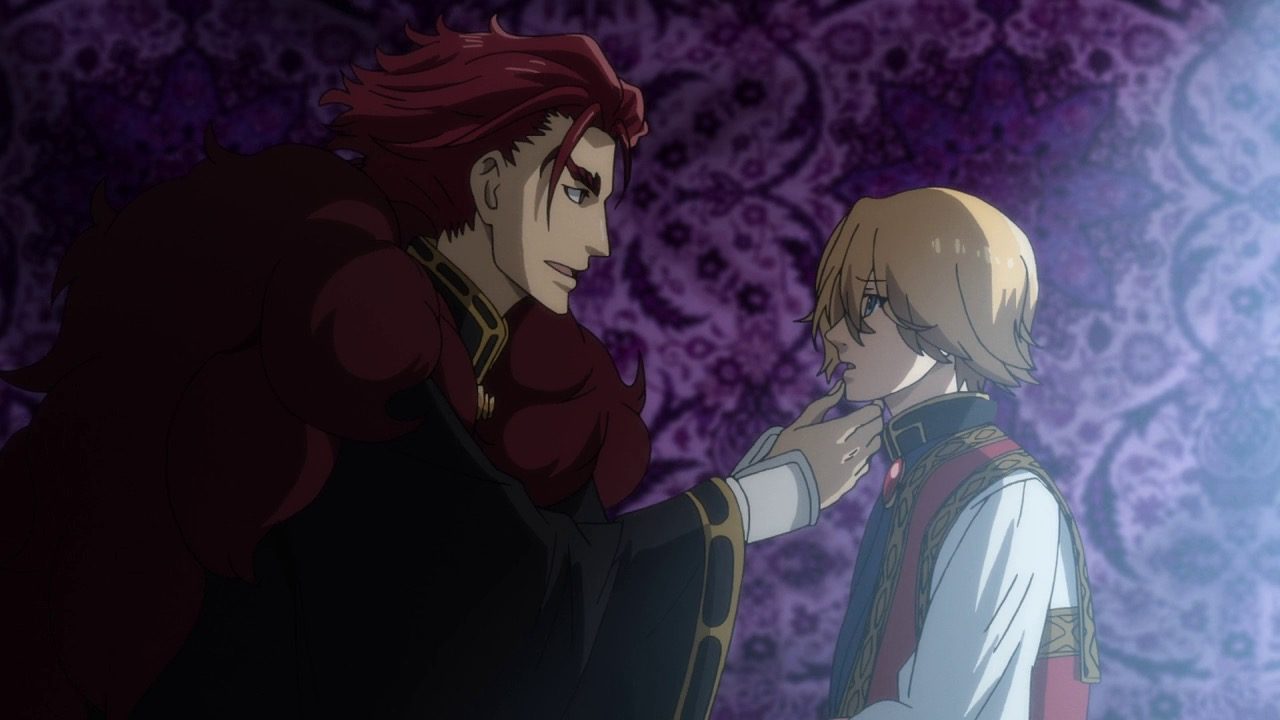


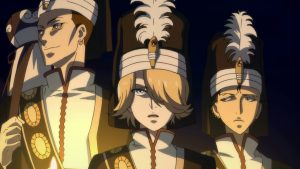
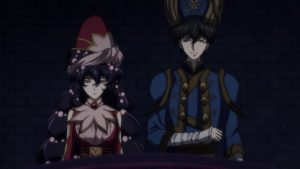



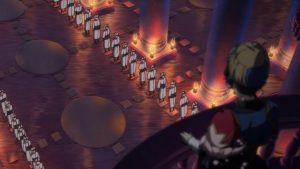
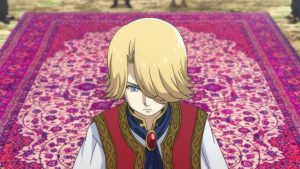

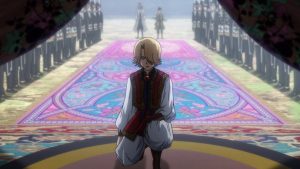



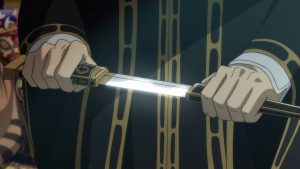




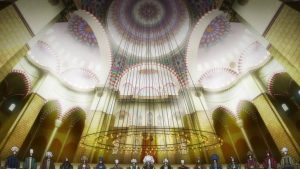


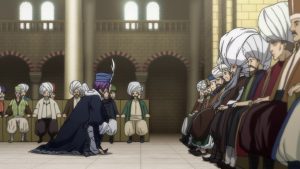
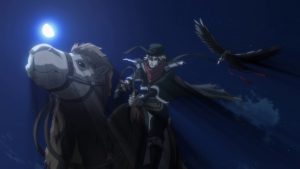


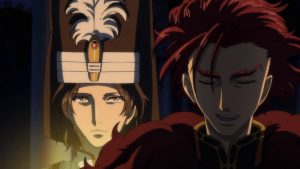
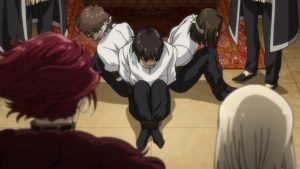
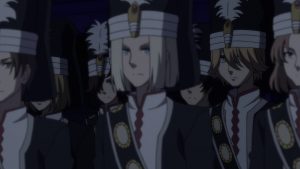





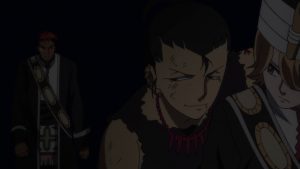



Earthlingzing
September 10, 2017 at 6:56 amI find the blend of shounen and history here pretty fascinating, you don’t get many anime series like these nowadays. My gut feeling here is that Zaganos isn’t a match for Louis, he’s smart but way too overconfident.
Guardian Enzo
September 10, 2017 at 9:13 amHe’s also much younger. I don’t imagine him to be all that much older than Mahmut.
One thing I like about this series is that it’s very clear in addressing the fact that Mahmut’s youth is a major factor – even he’s open about it. It’s the older players in this game who have the advantage in experience and guile.